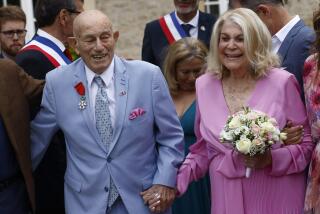Singledom a Casualty of the Crisis
- Share via
When Sgt. Robert Pitts of the California National Guard was told he was being deployed to Kuwait in the wake of the Sept. 11 attacks, his response was simple. He turned to his girlfriend, 26-year-old Reyna Garcia, and uttered four profoundly affecting words: “Will you marry me?”
“I told her, ‘Yes, we’re going to do this. I want to make this right
In the last two weeks, plenty of soldiers have reconsidered the single life. Chris Molnar, a chaplain at Camp Roberts, is not surprised. “At times like this, people make commitments they normally wouldn’t,” said Molnar. “People’s emotions are very close to the surface.”
Molnar, who also works as a Lutheran pastor in San Luis Obisbo, spent several days interviewing 300 soldiers preparing to be sent overseas. Some talked about wanting to get married; a few even set a date. “The events ... have interjected a greater sense of urgency,” said Molnar. “Many have had long relationships but they were just putting it off. Now, they feel they need to make that commitment.”
Robert Harris, a Virginia attorney who performs civil marriages and works near Langley Air Force Base, said that since Sept. 11 he has married twice as many couples as usual. “I guess they felt the urge of the situation,” said Harris, adding that during the Gulf War there was also a spike in marriages.
In neighboring Norfolk, home to the country’s largest naval base, deputy court clerk Cynthia Smith said there has been a surge of couples applying for marriage licenses. “In the last week, at least twice as many,” she said. “And I guess it’s because of everything that is going on.”
Even for couples not facing military deployment, discussions about marriage may become more urgent in the wake of the attacks. “People cling to each other much, much, more,” said James Woods, a Los Angeles therapist who counsels couples. “People who are together, become closer. They overcome their petty, trivial difficulties. All of a sudden, people transcend ongoing problems. A pretty serious trauma awakens that in people.”
It’s a vital response, said David Popenoe, a professor of sociology and co-director of the National Marriage Project at Rutgers University. “In times of uncertainty, people establish close relationships, focusing on the single most significant, and meaningful, thing in their lives,” said Popenoe. “If things go wrong, you want something strong to fall back upon.”
Cell phone calls from victims trapped on the planes, and in the World Trade Center, poignantly showed people’s priorities in extreme circumstances, said Popenoe. “They phoned home to reiterate their love.” This cataclysm, predicted Popenoe, who has studied marriage trends for 25 years, will prompt more people to marry.Those already married may also forge tighter bonds, he added. “Wouldn’t it be hard to go through a divorce right now compared to two weeks ago?” he asked.
Making a commitment such as marriage is more than a response to the attacks, say the experts, it is also a symbolic act of hope and defiance. “It’s a survival instinct,” said Woods.
“If we do go to war, it’s another way people may reach out for some sort of connection.” For Pitts and Garcia, the Sept. 29 ceremony at the camp is only the beginning. Pitts said he will plan a second, bigger wedding when he comes home.
He didn’t want to reveal specifics because he wants his wife, his “queen” to be surprised. But he did want her to know this: “I love this woman. She brings out the best in me. I’m ready.”
More to Read
Sign up for Essential California
The most important California stories and recommendations in your inbox every morning.
You may occasionally receive promotional content from the Los Angeles Times.













